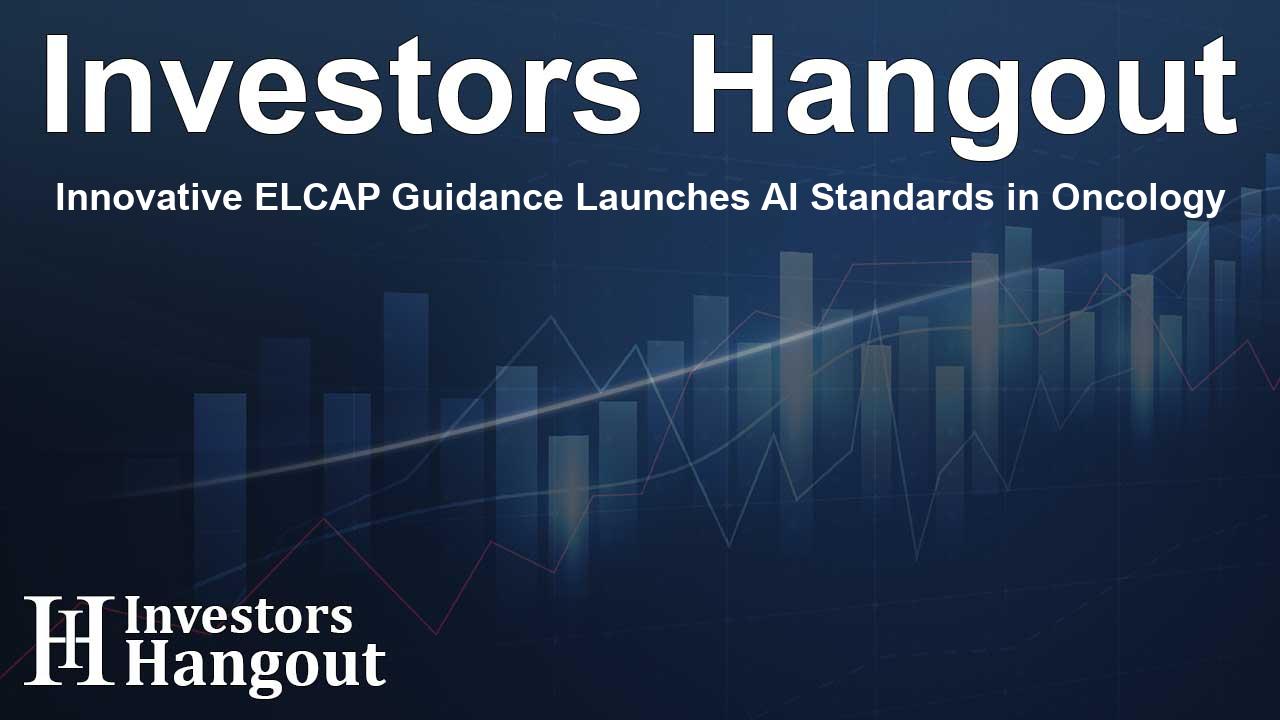Innovative ELCAP Guidance Launches AI Standards in Oncology

New ELCAP Guidance Enhances AI Safety and Integration in Cancer Care
The ELCAP guidance sets standards for responsible AI use in oncology, protecting patients and supporting clinicians.
As artificial intelligence tools evolve and make their way into healthcare, it becomes vital to establish frameworks that ensure patient safety and effective usage. Recently, the European Society for Medical Oncology (ESMO) introduced the Guidance on the Use of Large Language Models in Clinical Practice (ELCAP), which serves as a pioneering structured framework dedicated to integrating AI effectively into oncology practices. This significant announcement coincided with a session at the ESMO Congress, showcasing a commitment to harnessing innovative technologies responsibly.
Fabrice André, the President of ESMO, emphasized the essence of this guidance, stating, "Innovation must serve oncologists and, ultimately, patients, not confuse or mislead them." The ELCAP guidance offers a practical approach for utilizing AI responsibly within the oncology field, ensuring that data remains protected while supporting informed decision-making and clinical oversight.
Categories of AI Applications in Oncology
The ELCAP framework categorizes AI applications into three distinct areas, each with tailored safety and governance recommendations:
1. Patient-facing Tools
This category includes chatbots and virtual assistants designed to provide patients with symptom information or treatment guidance. However, these tools must always operate under professional supervision and should never replace the advice provided by healthcare professionals.
2. Clinician-facing Tools
This encompasses AI systems that support medical decision-making, documentation, and translation. It is essential for these tools to undergo formal validation processes and ensure clear accountability to maintain integrity and trust in healthcare interactions.
3. Background Systems
Background systems refer to AI implementations within hospital infrastructures—such as electronic health records—that handle tasks like data extraction or clinical trial matching. These systems require robust institutional oversight and continuous monitoring to safeguard patient information and enhance care delivery.
Miriam Koopman, Chair of the ESMO Real World Data and Digital Health Task Force, highlighted the significance of the guidance: "The value of AI depends on who is using it. ELCAP sets expectations for each context, ensuring patients are protected, clinicians are supported, and institutions are accountable." This perspective underscores the idea that successful AI integration hinges not just on technology but on establishing shared standards across the healthcare system.
The Trust Factor in AI Technologies
Trust in AI does not simply stem from technological advancements; it arises from establishing collective standards and guidelines. André concluded by reinforcing the importance of the ELCAP guidance: "Trust in AI doesn't come from technology alone; it comes from shared standards. ELCAP is our contribution to making AI a safe and effective ally in oncology." With a vast global network comprising 45,000 oncology professionals, ESMO positions itself as a pivotal leader in advocating responsible AI adoption in cancer care.
Conclusion
The introduction of the ELCAP guidance marks a significant step forward in the realm of oncology. By setting clear standards and ensuring the responsible use of AI, ESMO is paving the way for enhanced patient care and a more informed clinical environment. As healthcare continues to evolve, frameworks like ELCAP will be essential in ensuring that innovation aligns with the fundamental goal of patient protection and support for healthcare professionals.
Frequently Asked Questions
What is the main aim of the ELCAP guidance?
The ELCAP guidance aims to establish standards for the responsible use of AI in oncology, ensuring patient safety and supporting clinicians.
How many categories of AI applications does ELCAP define?
ELCAP categorizes AI applications into three main areas: patient-facing tools, clinician-facing tools, and background systems.
Who is responsible for the oversight of AI applications in healthcare?
ESMO emphasizes that institutional oversight and continuous monitoring are essential for safe and effective AI integration within healthcare systems.
Why is trust important in AI usage in healthcare?
Trust is crucial because it ensures that AI tools are used correctly and safely, based on shared standards and guidelines established by the healthcare community.
What is ESMO's role concerning AI in oncology?
ESMO serves as a global leader in promoting responsible AI adoption in cancer care, supporting both clinicians and patients through innovative frameworks like ELCAP.
About The Author
Contact Caleb Price privately here. Or send an email with ATTN: Caleb Price as the subject to contact@investorshangout.com.
About Investors Hangout
Investors Hangout is a leading online stock forum for financial discussion and learning, offering a wide range of free tools and resources. It draws in traders of all levels, who exchange market knowledge, investigate trading tactics, and keep an eye on industry developments in real time. Featuring financial articles, stock message boards, quotes, charts, company profiles, and live news updates. Through cooperative learning and a wealth of informational resources, it helps users from novices creating their first portfolios to experts honing their techniques. Join Investors Hangout today: https://investorshangout.com/
The content of this article is based on factual, publicly available information and does not represent legal, financial, or investment advice. Investors Hangout does not offer financial advice, and the author is not a licensed financial advisor. Consult a qualified advisor before making any financial or investment decisions based on this article. This article should not be considered advice to purchase, sell, or hold any securities or other investments. If any of the material provided here is inaccurate, please contact us for corrections.
